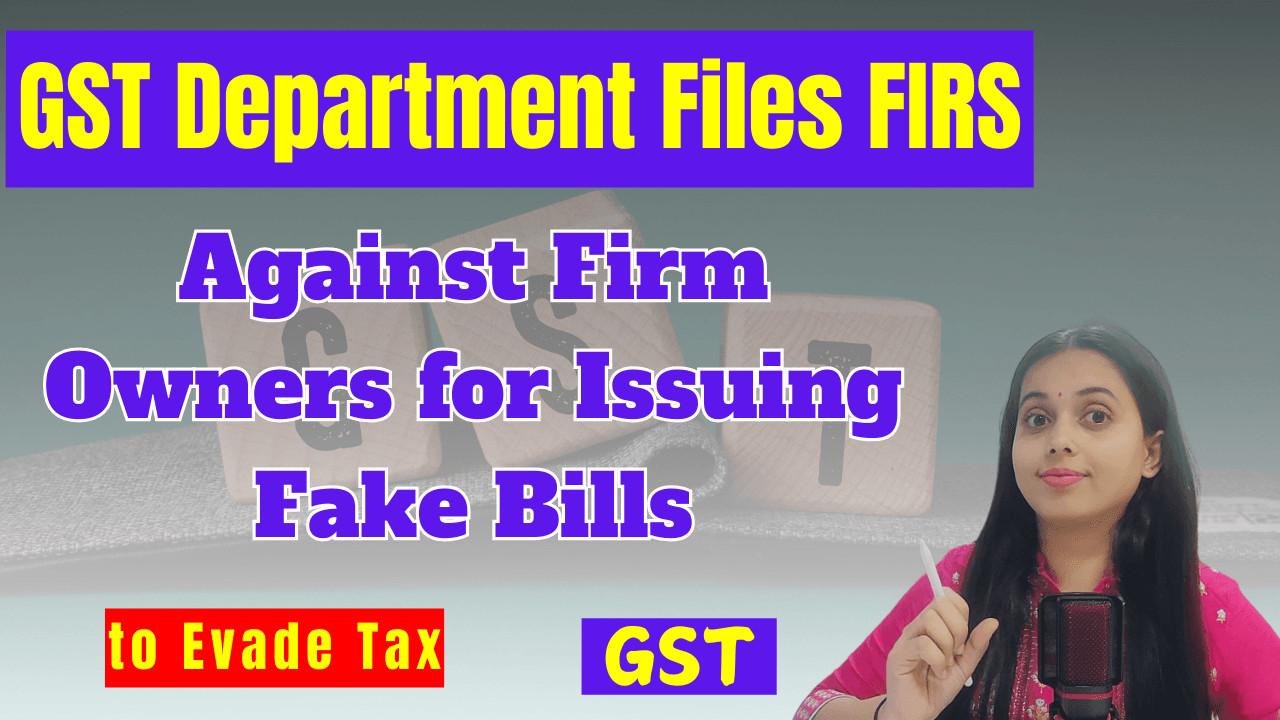Against Firm Owners for Issuing Fake Bills
Against Firm Owners for Issuing Fake Bills The Goods and Services Tax (GST) department has intensified its crackdown on tax evasion by lodging three FIRs against different firm owners and partners for issuing fake bills. These fraudulent activities cause significant losses to the government exchequer and violate multiple legal provisions. The recent cases highlight how the authorities are taking strict action to curb such practices.
Crackdown on Fake Billing Fraud
Fake billing fraud involves issuing invoices without an actual supply of goods or services to fraudulently claim Input Tax Credit (ITC). Against Firm Owners for Issuing Fake Bills Such activities are a violation of the GST Act and attract severe legal consequences, including penalties, prosecution, and even imprisonment. The latest FIRs reflect the GST department’s commitment to eliminating such fraudulent activities.
Case 1: Juneja Hosiery and Prabhjot Singh Juneja
The first FIR was registered against Prabhjot Singh Juneja, a resident of New Bajwa Nagar, Ghati Mohalla, and his partners. The accused own Juneja Hosiery, which was allegedly involved in issuing fake bills to evade tax. Against Firm Owners for Issuing Fake Bills GST official Jaspal Singh reported that the firm’s fraudulent activities resulted in substantial revenue loss to the government.
The Division Number 4 police registered the FIR under:
- Section 132 of the GST Act (relating to tax fraud and evasion)
- Sections 319 (cheating by personation), 318 (cheating), 336 (forgery), 337 (forgery for record), 338 (forgery for valuable security, will, etc.), 340 (using forged documents as genuine), and 61 (criminal conspiracy) of the Bharatiya Nyaya Sanhita (BNS)
Case 2: Shiv Shakti Enterprises and Surinder Kumar
The second FIR was lodged against Surinder Kumar, owner of Shiv Shakti Enterprises, located in the Jaspal Bangar area. Against Firm Owners for Issuing Fake Bills GST official Ashwani Kumar filed the complaint, stating that the firm had been engaged in issuing fake invoices to fraudulently claim ITC.
The Sahnewal police registered an FIR under the following charges:
- Section 132 of the GST Act (for tax evasion)
- Cheating, forgery, and criminal conspiracy under the BNS
Case 3: Gurjas Arts and Amritpal Singh
The third FIR was lodged against Amritpal Singh, owner of Gurjas Arts, a firm based on Gill Road. The GST department found that Gurjas Arts was involved in issuing fake bills, leading to tax evasion.
The Sahnewal police registered an FIR against Amritpal Singh under:
- Section 132 of the GST Act
- Cheating and forgery-related offences under the BNS
Legal Consequences of Fake Invoicing Under GST
The GST law has strict provisions to penalize those involved in fake billing scams. Against Firm Owners for Issuing Fake Bills Section 132 of the GST Act categorizes offences and prescribes punishments based on the extent of tax evasion:
- Tax evasion exceeding ₹5 crore: Imprisonment up to 5 years with a fine
- Tax evasion between ₹2 crore and ₹5 crore: Imprisonment up to 3 years with a fine
- Tax evasion between ₹1 crore and ₹2 crore: Imprisonment up to 1 year with a fine
- Repeat offenders may face enhanced penalties and cancellation of GST registration.
Additionally, the accused can be charged under various provisions of the BNS, leading to further legal complications, including potential property attachment and business closures.
How GST Authorities Detect Fake Billing
The GST department has adopted various advanced methods to detect and prevent fake billing fraud, including:
- Data Analytics & AI: Using advanced data analytics tools to track unusual transactions.
- Invoice Matching: Against Firm Owners for Issuing Fake Bills Comparing purchase invoices with corresponding sales invoices to detect discrepancies.
- E-Way Bill Verification: Cross-checking e-way bills with actual movement of goods.
- GSTIN Tracking: Monitoring suspicious transactions linked to a specific GSTIN.
- Raids & Inspections: Conducting on-site inspections and surprise audits to uncover fraudulent activities.
Impact on Businesses and Taxpayers
Engaging in fake billing not only attracts legal penalties but also severely damages a firm’s reputation. Businesses caught in such fraud may face:
- Hefty fines and penalties
- Cancellation of GST registration
- Difficulty in obtaining loans and business financing
- Loss of trust among customers and suppliers
Preventive Measures for Businesses
To avoid falling into legal trouble, businesses should:
- Ensure all invoices are genuine and backed by actual transactions.
- Maintain accurate financial records and file timely GST returns.
- Conduct internal audits to verify transactions.
- Avoid dealing with suspicious vendors offering tax benefits through fake bills.
Conclusion
Against Firm Owners for Issuing Fake Bills The recent FIRs filed against firm owners for issuing fake GST bills highlight the increasing scrutiny of tax authorities on fraudulent practices. Against Firm Owners for Issuing Fake Bills The government is taking strict actions against businesses involved in such scams, using technology and stringent laws to detect and penalize offenders. Businesses must ensure compliance with GST regulations to avoid legal consequences and maintain their credibility in the market.
As the GST system evolves, transparency and compliance are key to staying out of legal trouble. Any business involved in fraudulent activities should take corrective action immediately to prevent severe penalties and reputational damage.
For More Information : https://taxgyany.com/

